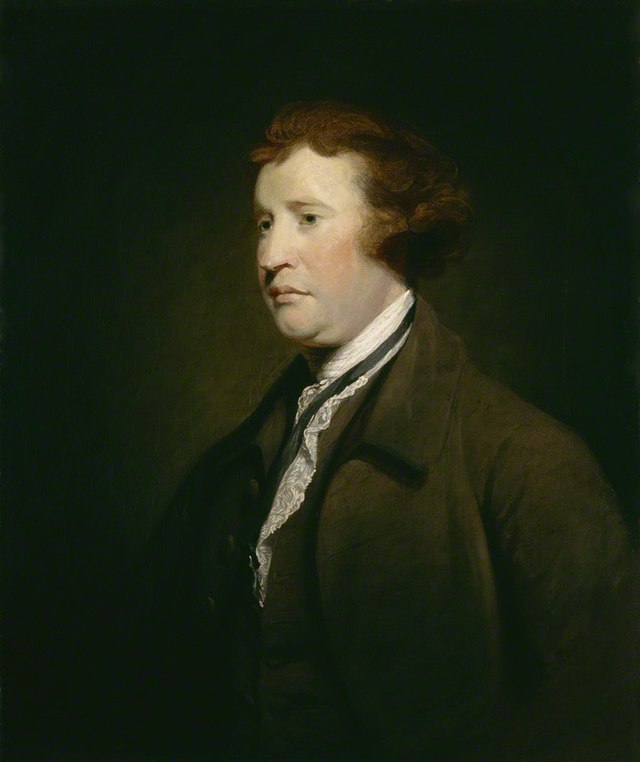Edmund Burke (1729 –
1797) is probably best known for his work against French Revolution,
but before that he also published these two interesting writings.
First of these is, at least according to the editorial introduction,
a satirical pastiche aimed against Lord Bolingbroke, leading deist of
the time. Bolingbroke had argued that original Christianity had been
defiled through centuries of convention by all sorts of mystical
rituals, which were disastrous to believers and against reason, thus
calling for a return to this supposed natural belief. Burke makes an
analogical move and argues that by same token civilized societies are
artificial and therefore a return to natural state is in order.
Vindication
might be satirical, but Burke's argument can be taken quite
seriously. The existence of
polities and states has meant almost a constant continuation of
territorial skirmishes, often leading to total warfare. If Hobbes had
thought that commonwealths were founded as an antidote to constant
battle, the medicine proved to be even more poisonous, Burke points
out.
Even
in times of peace, a commonwealth is not a pleasant place to live,
Burke continues. If the power lies in the hand of a single
individual, freedom of everyone else is subdued under a tyrannical
power. The case is not mush better, if the power is given to a small
group of aristocrats, because that just means there are more tyrants
to subdue everyone. Even democracies are far from pleasant, because
the people or rabble can be even more intolerant in its decisions
than all tyrants together – besides, rabble usually just follows
some demagogue and thus produced just a new tyranny.
These
arguments are interesting, because they sound quite similar to what
one might expect from, on the one hand, anarchist, on the other hand,
libertarian thinkers – states are a form of oppression that
artificially divide the world into hostile areas. Of course, one could be more of a Hobbesian and
ask whether living in societies has some positive consequences, which
would weigh more than the supposed loss of freedom. Another question
is whether the supposed natural or original state of humans is not
just another artificial construction, which just reflects the mores of
our own times.
Second work I shall
study is Burke's book on philosophical aesthetics. It was a success
at least on the continent, and such German philosophers as Moses
Mendehlsson and Immanuel Kant were inspired by his work. Burke's
basic attempt in the book is to explain the difference between two
aesthetic notions, sublime and beautiful. Of the two, beauty seems
a more familiar concept, so I am going to begin with it, although
Burke prefers the opposite order.
A common idea of
beauty has been that it has something to do with harmony and is thus
mathematical in nature, because harmony is defined by numerical
proportions. Burke has a bit of fun with the idea, noting that our
sense of beauty is immediate and not dependent on taking exact
measurements of e.g. limbs of an animal. A related theory of
beautiful has connected beauty with fitness or utility, which is
often decidable by mathematical proportions (for instance, an animal
with limbs quite out of proportion cannot live). But Burke will have
none of this. True, we do find quite unhealthy specimens grotesque,
but we do also meet often healthy animals and people that we do not
think beautiful.
Instead, Burke
characterizes beauty through the notion of love, which beautiful
things make us feel. Here, love appears to be used not in any
Platonic, but in quite sensuous sense. Indeed, when we hear
Burke describing smoothness as one type of beauty and read him
describing the lure of a beautiful roundness of female breasts, it
becomes rather obvious that Burke's love is more like sexual or at
least sensual titillation. Quite noteworthy is then that Burke's
description of beautiful seem to come from the perspective of a
heterosexual male: beautiful thing must be small and weak,just like
beautiful women are supposed to be. We might then say that Burke's
notion of beauty is quite conservative, but at least open about its
bias.
What is remarkable
is that Burke allows a variety of different aesthetic notions: in
addition to beautiful, we also have sublime. Of course, the notion of
sublime is not Burke's own invention, but goes back to Longinus and
his work on the topic. Sublime, Burke notes, is not a species of
beautiful, but more like it's opposite. While beauty is connected
with love, sublimity is connected with fear – it is pleasure caused
by great proportions and immeasurable quantities that overwhelm us.
While fear itself is not a pleasant feeling, sublime objects can
awaken a sort of second order feeling, in which we reflect on our
primal sense of fear and discomfort and find pleasure, when we
understand and win our fear.
The notion of
sublime is interesting, because it widens the realm of aesthetic
notions – thing doesn't have to be traditionally pretty to be
aesthetically interesting. Indeed, we could raise the question,
whether the two notions truly are all the the aesthetic feelings we
are capable of. If our sense of beautiful is caused by sensual
titillation and our sense of sublime is caused by fearsome awe, could
objects and events causing feelings like nausea or boredom cause also
similarly aesthetic emotions as happens in case of sublime objects
Burke has still
plenty of interest to say about e.g. the aesthetic effect of words
(Burke notes that, unlike many modern thinkers had thought, words
need not constantly produce images or representations of things they
mean, but they can directly cause feelings, for instance, because of
constant use – if virtue has been spoken of in suitably solemn
occasions, the mere word will rouse that same solemn feeling again).
Still, I am going to leave Burke's aesthetic theories here and move
on to another philosopher.

Ei kommentteja:
Lähetä kommentti